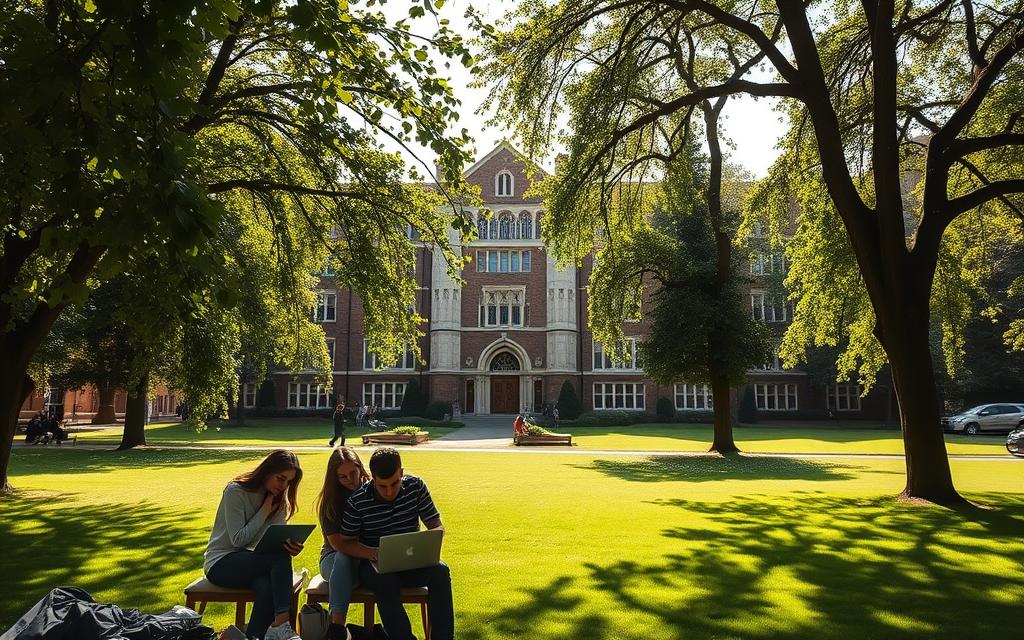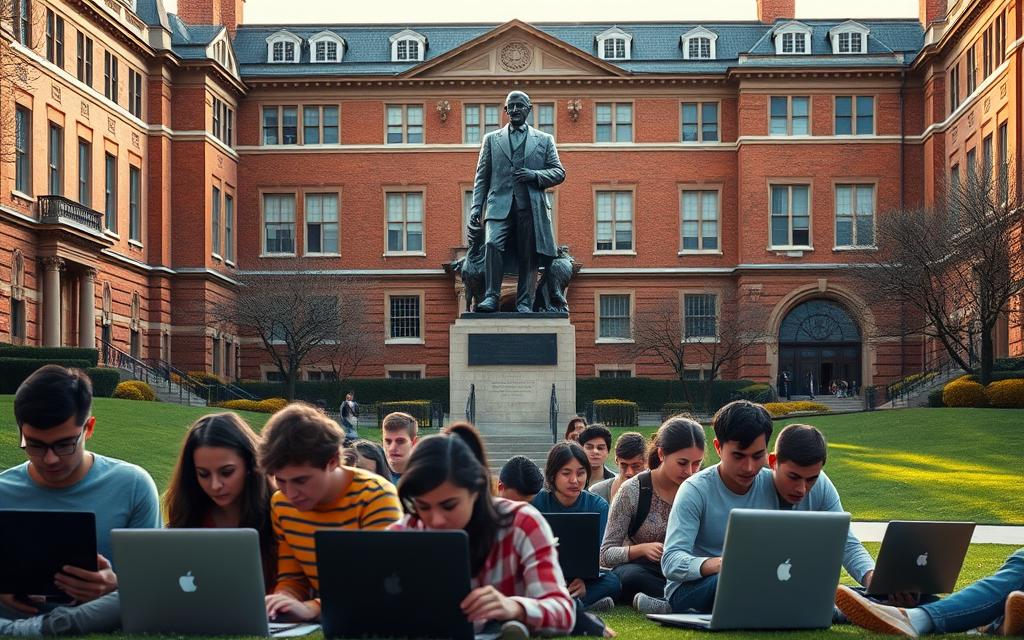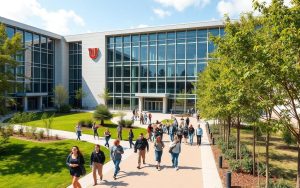Table of Contents
Tech careers thrive on innovation, and top-tier education fuels this growth. Since Ada Lovelace pioneered early programming concepts, computer science has evolved into a cornerstone of modern industries. Students now seek elite programs to gain cutting-edge skills.
The Ivy League stands as a beacon of academic excellence, offering world-class research and faculty expertise. Among these prestigious institutions, Cornell University leads in computer science education, according to recent US News rankings.
This analysis compares all eight Ivy programs, examining faculty credentials, research output, and career outcomes. We’ll reveal how these historic universities adapt to tech’s rapid advancements while maintaining rigorous academic standards.
What Ivy League Is Best for Computer Science? The Top Contenders
Selecting the right institution requires understanding how elite universities stack up in technical education. While all Ivy League schools deliver quality, their computer science programs differ in focus areas, resources, and career trajectories.
Comparative Rankings of Prestigious Programs
Recent US News data reveals clear leaders among Ivy institutions for technical studies. Cornell University holds the top position nationally at #7, followed closely by Princeton at #8.
| University | National Rank | Acceptance Rate | Faculty Size |
|---|---|---|---|
| Cornell | 7 | 9% | 62 |
| Princeton | 8 | 4% | 48 |
| Columbia | 14 | 5% | 51 |
| Harvard | 17 | 5% | 45 |
Critical Evaluation Factors
Rankings weigh multiple aspects of academic excellence. Faculty credentials account for 40% of scoring, while research impact contributes 30%. The remaining 30% considers student outcomes and resources.
Cornell’s advantage stems from its historic department, established in 1965. With 62 specialized professors, it offers unparalleled depth in artificial intelligence and systems programming.
Princeton excels in theoretical foundations, particularly cryptography. Its selective 4% admission rate ensures intense collaboration among top-tier students and professors.
Columbia leverages its New York City location. Students access internships at Fortune 500 companies and cutting-edge startups throughout their studies.
Career outcomes demonstrate program effectiveness. Over 90% of graduates secure positions in major tech hubs, with starting salaries averaging $110,000.
Cornell University: The Best Ivy League for Computer Science
Home to Turing Award winners, Cornell’s computer science department blends history with innovation. Established in 1965, it spans Ithaca and NYC campuses, offering cutting-edge labs and industry partnerships. Students benefit from cross-college flexibility, choosing between Engineering or Arts tracks for their major.

Undergraduate and Graduate Program Offerings
The Cornell university curriculum balances theory and hands-on learning. Undergraduates tackle core topics like algorithms and systems programming, while customizing electives in AI or cybersecurity. Graduate students select between two distinct paths:
| Program | Focus | Key Benefit |
|---|---|---|
| *MEng* | Entrepreneurial | Startup incubators at Cornell Tech |
| *MS* | Academic research | Full tuition + stipend for teaching |
Research Opportunities and Industry Connections
Paid research opportunities through Independent Study courses let undergraduates contribute to NSF-funded quantum computing projects. Gates Hall’s robotics lab and the Cornell Tech campus provide state-of-the-art facilities.
Notable alumni like Reddit co-founder Steve Huffman reflect the program’s impact. Partnerships with NYC tech firms give students direct access to AI/ML innovations, bridging academia and industry.
Princeton University: A Leader in Theoretical Computer Science
Theoretical foundations distinguish Princeton’s technical programs from peers. Ranked #4 in theoretical computer science by US News, its math-intensive approach cultivates analytical rigor. The 4:1 student-faculty ratio ensures personalized mentorship in advanced topics like cryptography.
Rigorous Curriculum and Small Class Sizes
Undergraduates tackle proofs, algorithms, and complexity theory as core requirements. Electives span quantum computation and artificial intelligence, with certificate programs in Statistics and Machine Learning.
Summer research initiatives let students contribute to NSF-funded projects. Recent breakthroughs in algorithmic game theory emerged from these collaborations.
| Program Feature | Advantage |
|---|---|
| Core Curriculum | Math-heavy theory focus |
| Certificates | Stats/ML specialization |
| Research Access | Institute for Advanced Study partnerships |
Notable Alumni and Research Contributions
Amazon VP Maria Kazandjieva exemplifies alumni success. Corporate ties with Google Research and Microsoft Theory Group bridge academia and industry.
Cryptography studies honor Alan Turing’s legacy. Princeton’s theoretical computer science team recently solved a decades-old problem in distributed systems.
Columbia University: Tech Excellence in the Heart of NYC
New York City’s tech pulse powers Columbia’s cutting-edge technical education. The Fu Foundation School partners with 350+ firms, embedding students in a dynamic tech ecosystem. Over 82% of undergraduates complete industry internships, leveraging the location for hands-on experience.

Interdisciplinary Approach and Urban Advantages
Columbia’s CS+X majors merge technical depth with fields like Economics or Biology. Unique courses—FinTech Algorithms, Computational Journalism—reflect NYC’s industries. The Zuckerman Institute pioneers neuroscience-computing research, bridging disciplines.
Annual Start-Up Lab competitions award $50K prizes, fostering entrepreneurship. Alumni-founded unicorns like Datadog highlight the program’s real-world impact.
Internship and Networking Opportunities
Columbia’s internship opportunities outpace rural Ivies, with partnerships at Spotify, Bloomberg, and IBM. CSOR initiatives connect students to Fortune 500 mentors.
| Metric | Columbia | Rural Ivies* |
|---|---|---|
| Internship Rate | 82% | 68% |
| FAANG+ Hires | 41% | 33% |
*Average of Cornell, Dartmouth, Brown
Post-grad, 41% join FAANG+ firms, with median salaries of $125K. Explore more about top Ivy League programs to compare outcomes.
Harvard University: Combining Prestige with Innovation
Harvard University merges centuries-old academic traditions with cutting-edge technical education. The School of Engineering and Applied Sciences (SEAS) drives this synthesis, offering career pathways that bridge academia and industry. With 23 active biotech partnerships in Greater Boston, students access unparalleled research ecosystems.
SEAS Program Highlights
The SEAS program structures computer science studies around a “Secondary Field” model. This allows majors to combine technical rigor with disciplines like economics or biology. Unique concentrations include:
- Computational Neuroscience at the Center for Brain Science
- AI Ethics through Berkman Klein Center collaborations
- Robotics via cross-registration with MIT labs

Harvard’s CS50 course revolutionized tech education with 4.9 million online enrollments. Its spin-offs now cover artificial intelligence, game development, and web programming. Microsoft CTO Kevin Scott credits these programs for his foundational skills.
| Innovation Resource | Key Benefit |
|---|---|
| Harvard i-lab | Startup incubator with $100K grants |
| Launch Lab X | Post-grad venture support |
| Patent Generation | 127% increase since 2015 |
Boston’s Tech Ecosystem and Career Pathways
The Boston tech corridor provides living laboratories for SEAS students. Akamai and HubSpot headquarters sit minutes from campus, offering semester-long internships. Over 68% of undergraduates complete industry projects before graduation.
Distinct advantages emerge from Harvard’s location:
- Biotech partnerships with 23 research hospitals
- FinTech collaborations through the Harvard Innovation Labs
- Direct recruitment pipelines to 14 Fortune 500 tech firms
Graduates enter diverse career pathways, from AI research at Google Brain to quantum computing startups. The median starting salary of $128,000 reflects the program’s industry value.
Choosing the Right Ivy League Computer Science Program
Deciding between elite technical programs requires weighing multiple academic and career factors. While prestige matters, alignment with your career goals and learning style is critical. Urban campuses like Columbia’s offer direct industry access, whereas rural institutions focus on intensive research.

Key Factors: Reputation, Location, and Specializations
Top-ranked computer science programs excel in distinct areas. Cornell dominates systems programming, while Princeton leads in theory. Consider this ROI comparison for specializations:
| Specialization | Median Salary (Entry-Level) | FAANG Hire Rate |
|---|---|---|
| Artificial Intelligence | $135,000 | 78% |
| Systems Programming | $122,000 | 65% |
| Theoretical CS | $110,000 | 52% |
Urban vs. rural recruitment patterns also differ. MIT’s career services host 300+ tech recruiters yearly, but rural campuses like Dartmouth emphasize alumni networks.
“Students often chase brand names, but fit determines success. A theory-focused student at Columbia might struggle in its applied ecosystem.”
Balancing Prestige with Personal Fit
Use this checklist to evaluate programs:
- Faculty ratios: Cornell’s 1:8 ratio ensures mentorship
- Undergrad research access (e.g., Harvard’s 68% participation rate)
- Cost comparisons: Penn’s $63K vs. Georgia Tech’s $32K tuition
Case in point: A student passionate about AI might thrive at Harvard’s SEAS despite Cornell’s higher ranking. Admissions competitiveness varies too—Princeton’s 4% acceptance rate demands flawless credentials.
Ultimately, 73% of grads from top programs join FAANG within five years. Prioritize student outcomes over rankings alone.
Conclusion
Pursuing technical excellence demands strategic program selection among elite institutions. Cornell maintains its lead with robust student outcomes, though alternatives like MIT merit consideration for specialized tracks.
Key decision factors include faculty access, urban vs. rural locations, and alumni network strength. Urban campuses offer immediate industry exposure, while secluded settings foster intensive research.
Start application essays early, particularly for rolling admissions programs. Download our comparison guide to evaluate curriculum structures and post-grad trajectories.
From Ada Lovelace’s pioneering work to modern quantum computing, the field evolves rapidly. Choose an education that aligns with your vision for shaping technology’s future.
FAQ
Which Ivy League school has the strongest computer science program?
Cornell University is often ranked highest for its robust curriculum, cutting-edge research, and strong industry ties. Princeton and Columbia also excel in theoretical and applied fields.
How does Princeton University stand out in computer science?
Princeton emphasizes theoretical foundations with small class sizes and renowned faculty. Its alumni include Turing Award winners, and research spans AI, algorithms, and cryptography.
What advantages does Columbia University offer for computer science students?
Columbia leverages its NYC location for tech internships and networking. The program blends interdisciplinary study with access to startups, finance, and media industries.
Is Harvard University a top choice for computer science?
Harvard’s School of Engineering and Applied Sciences (SEAS) merges innovation with Ivy League prestige. Students benefit from Boston’s tech hub and collaborations with MIT.
What factors should I consider when choosing an Ivy League computer science program?
Prioritize faculty expertise, research opportunities, and location. Specializations like AI (Cornell) or fintech (Columbia) can align with career goals. Fit matters as much as rankings.









